Search for “what is marriage” in an online dictionary ! What you will find is “the formal union of a man and a woman, typically as recognized by law, by which they become husband and wife.” That’s it ! However, there is a lot more that is offered by the marriage ceremony to the bride and the groom. Let’s look towards it through a spiritual perspective to explore how.
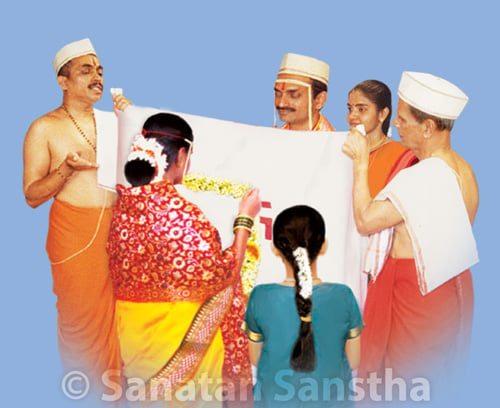
Hindu Dharma has advised sanskars (Vedic rituals to create subconscious impressions) to be performed during the sixteen principal events of life, so as to move closer to God. The most important of them being the ‘Vivah sanskar (Marriage sanskar)’ ! In this interesting article, we will learn about the meaning of vivah, importance of marriage sanskar, matching of horoscopes while arranging a marriage etc.
1. Meaning of vivah (Marriage)
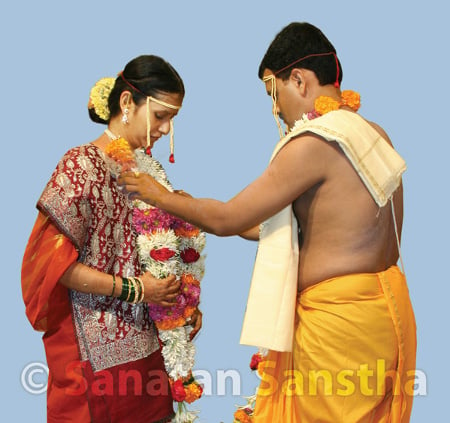
Taking the bride from her father’s home to one’s own home is termed as ‘vivah’ or ‘udvah’. Vivaha means Panigrahan, meaning the groom holding the hand of the bride to make her his wife. Since the man holds the hand of the woman, after marriage the woman should go and stay with the man. A man going and staying with the woman is inappropriate.
2. Importance of marriage sanskar – A spiritual perspective
A. Hindu Dharma has prescribed four Purusharthas (Four basic pursuits of life), that is Dharma , Artha (Wealth), Kama (Desires) and Moksha . The purpose of the marriage sanskar is to fulfill the Purushartha of ‘Kama’ and then gradually advance towards ‘Moksha’.
B. Several important things in the life of a man and woman are associated with marriage; for example, love between man and woman, their relationship, progeny, various happy events in their lives, social status and prosperity.
C. Society respects a married woman, which assists in keeping the society in a healthy state
Sight of a woman with kumkum (Vermillion) on her forehead, wearing a mangalsutra (A typical ornament worn by a married Hindu woman; it is a symbol of marriage and worn by the woman until her husband’s death) around her neck, green bangles, toe rings and six or nine-yard sari (A traditional attire of Bharatiya women) automatically generates respect for her in the mind of an observer. Due to the relationships of wife, daughter-in-law, paternal aunt, sister-in-law etc. after marriage, a woman automatically gets a respectable position. Viewing a woman (other than the wife) as a mother and with respect keeps the society in a healthy state. Such a woman can be looked upto as an ideal by spinsters. – God (Through Ms. Madhura Bhosale, 18th November 2005, 3.30 p.m.)
3. What should be the age for marriage ?
In the earlier times, at the age of eight after the upanayan sanskar (Thread ceremony), a boy would remain in his Guru’s (Spiritual Master’s) hermitage for at least twelve years. Thereafter, before entering the stage of gruhasthashram (Householder), for four to five years he would make efforts to develop the ability to earn a livelihood. Giving due consideration to all this, the age group of twenty-five to thirty years was considered as ideal for a boy’s marriage. Once the girl crossed her childhood stage, for the next five to six years she was taught how to shoulder worldly responsibilities. Hence, the age group of twenty to twenty-five years was considered ideal for marriage for a girl. From the spiritual perspective in the current period too, the above mentioned age groups are ideal for marriage of boys and girls.
4. Matching of horoscopes while arranging a marriage
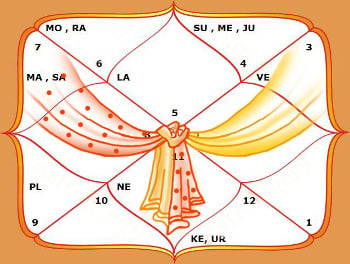
Before arranging a marriage, it is appropriate to match the horoscopes of the prospective bride and the groom. Hence, it is essential that the horoscopes of both are accurate. The individual who makes the horoscope should be proficient in his task too.
A. Limitations
Even if all thirty-six points in the horoscope match (100% compatibility), the compatibility between husband and wife or between average individuals is only about 10% and not 100%. Besides, in the present Yug (Era) one should keep in mind that only 35% astrological predictions as per horoscope are accurate.
Women use their maiden surname even after marriage
to advocate women’s emancipation, but such emancipation is not
solicited as it is against the principle of Hindu Dharma of merging with others !
It is an ancient tradition followed as per Hindu Dharma that a woman takes her husband’s surname after marriage; but nowadays, some women claiming to be progressive thinkers, use two surnames, i.e. their maiden surname and that of their husband.
The fundamental principle of Hindu Dharma is sacrificing ‘I’ while merging with others. The purpose behind the ancient tradition of girl using her husband’s surname was that she should completely merge with the family of her husband. There are several instances of Saints changing names of their disciples. The concept behind changing disciple’s name is that he should

leave behind everything like all ‘sanskars’ and ego attached with the name and merge with his Guru. The same principle was intended even in changing name of a woman after marriage and taking up name of her husband. In short, changing name of a woman after marriage is not because she should be tied with fetters but to make her progress spiritually. As such, by using her maiden surname, married woman is losing a spiritual opportunity to merge with others.
– H. H. Dr. Athavale
Advantages and disadvantages to parents due to love marriage of their children !
1. Advantage
A. The parents do not need to look for a groom/bride.
B. In daughter’s marriage her parents do not have to give dowry to the daughter’s in-laws.
C. The couple cannot blame their parents if the daughter and her husband do not get along well together.
2. Disadvantage
A. If the son cannot adjust with his wife and if the daughter also cannot adjust with her husband then they have to suffer. Yet the parents are spared from committing a sin because they had not arranged the marriage; hence there is no ‘Cause and effect’ (Karmaphalnyay) theory applicable to the parents.
B. Some parents unnecessarily hold themselves responsible for the marriage and curse themselves for that. They feel that they failed in their duty. They must remember that, birth, marriage and death depend upon the destiny of every person; hence they cannot be responsible for that marriage.
– H.H. Dr. Athavale

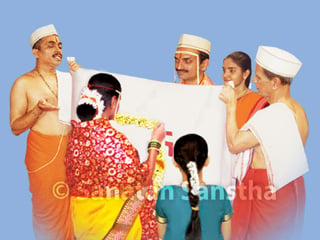 Spiritualization of the auspicious ceremony of marriage
Spiritualization of the auspicious ceremony of marriage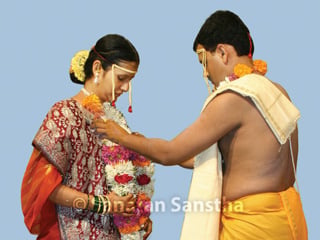 What should the bride and groom wear ?
What should the bride and groom wear ? Importance of matching horoscopes of the prospective bride and groom
Importance of matching horoscopes of the prospective bride and groom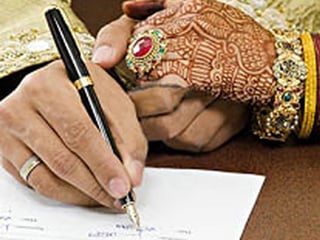 Registered Marriage : Yes or No ?
Registered Marriage : Yes or No ?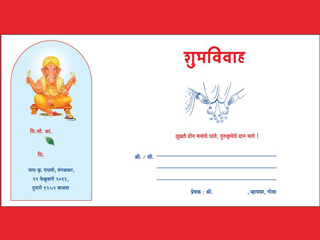 Wedding Invites
Wedding Invites
why should girl always change name , does the boy family won’t get merged to that of girls ??
I am curious to know
Namaskar Anusha ji
You have asked a nice question. The underlying spiritual reason for the wife embracing the husband’s name is given below –
According to spiritual science, the wife is entitled to half the fruits (merits) of the pious deeds and the sadhana of a virtuous man (her husband). The attainment of these merits uplifts her life; but for that she needs to achieve complete union with her husband. It is important for her to give up her own name, as well as maternal surname, to try to integrate with her husband’s family, etc. If that is achieved, the woman’s ego can be reduced and she can obtain the complete spiritual benefit of the marriage.
From this, we also realise that the man’s union with his wife’s family gives him pleasure on the mental level, while the woman’s union with her husband and his family benefits her on the spiritual level.
Warm regards
Sanatan Sanstha
Namaskar,
I have 2 questions. First, when we take up on guru, we choose the guru ourselves and feel the connection with the guru and thus we can progress spiritually. But, marriage is usually arranged and we don’t always form that connection with the husband, if our husband is adharmi. So, this is a shallow attempt at taking up the last name. Secondly, in south india where sanatan dharm is still followed they have matriarchal society. So, its the woman’s last name everyone has to take. Moreover, you mentioned they have to give up their first name as well, but most of our gods were called using their mothers name as mother is superior.
2) why do in-laws keep saying to woman that they have no connection with their parents home after marriage? Could you give me a reference from our vedas, not shastras ( as they are nit true reflections of our vedas)
Namaste Isha ji
Dhanyavad for reaching out to us. We are glad you asked
Firstly we do not choose a Guru. When an embodied soul (jiva) yearns for Moksha, the Guru tattva enters the jiva’s life as the Guru. Thus the Guru chooses the Shishya and not the other way around. It is a fundamental error in understanding the Guru-Shishya parampara that we choose our Guru.
Secondly, three major life events are due to Prarabdha (our accrued destiny) – Birth, Death, and Marriage. Just as we are born in a home or family or circumstances where we have the most give and take, our spouse is also the person with whom we have the most give and take. So even though superficially it appears as though we have chosen our partner (either through arranged marriage or mutual affection), it is predestined.
As far as the connection is concerned, it is at an emotional level. The article talks about the spiritual reasons and consequences of changing the name. Please see the answer to a related question asked by our reader Anusha about the underlying spiritual reasons.
Regarding your second question – The bride’s Kula changes post marriage. On the spiritual level, her give and take with her maternal family reduces. That is the actual reason. It is not that the bride should sever all relations with her maternal family.
It is prudent to note that Sanskars in Hindu Dharma are there to benefit the jiva on the spiritual level and not just the physical or psychological level.
Warm regards,
Sanatan Sanstha